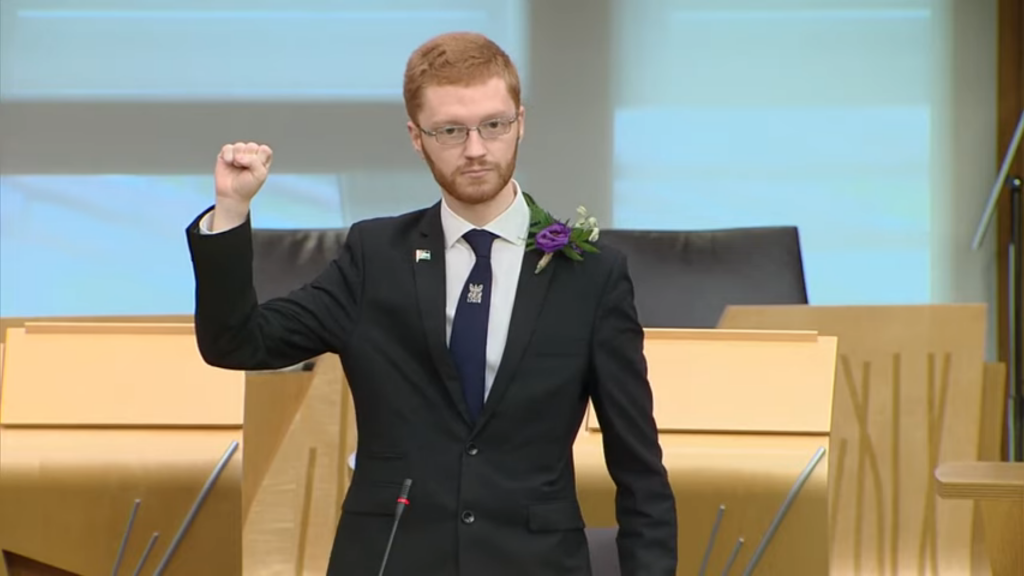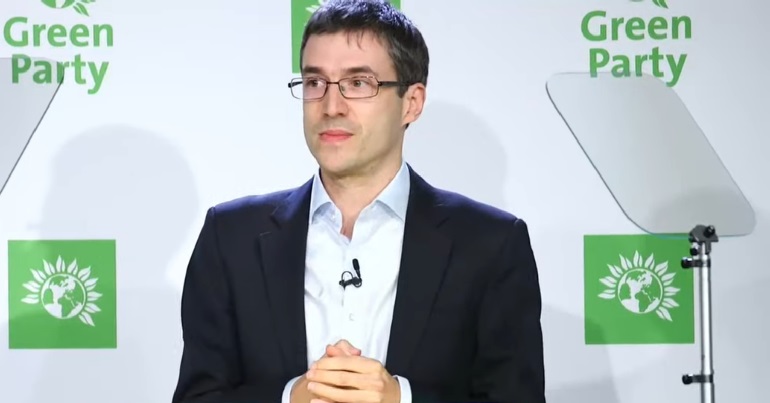From Labour MP to Green Party activist: Tony Clarke reflects on progressive alliances, activism and Corbyn’s troubles

I first met Tony Clarke when I came along to my first local Green Party meeting more than 3 years ago: we were meeting in a cellar bar, half a dozen of us squeezed around a table discussing local issues and the beginnings of a ‘target to win’ campaign. As long as I’ve known him he’s been a fierce Green Party activist, as well as enjoying a stint as a national spokesperson for the party, but it wasn’t always so: he used to be a Labour Party MP. I decided to interview him (via phone- we’re in different cities now), both to help him share the story of what led him from Labour to Green, an interesting story in itself, but also because of the relevance such a tale has for the current turmoil both the Labour Party and wider British politics is currently engulfed in.
He joined the Labour Party in the mid-1980’s, quickly rising to become a borough councillor in Northampton (his home town) in 1991, and then finally an MP for Northampton South in 1997, the year of Blair’s watershed victory and in the inauguration of ‘New Labour’. When talking about his decision to first get involved with the party he says that he has “always been a local activist… I joined so I could change things where I lived”. He describes a ‘good’ local party in Northampton, but argues that there was a larger debate about direction within the party going on as a backdrop to the local activism he was engaged in, a debate that he personally was distant from, but “one that was won by the Right…” nonetheless.
The Right might have been in the ascendancy within the Party, but their success came along with a few surprises. Tony describes the parliamentary seat he won in 1997 as one that was supposed to be unwinnable: “but such was the seismic shift in ’97 that we got in- those of us who might not have been quite as on message.” He describes his time in Parliament as “incredibly frustrating- it took me away from what I wanted to achieve locally. Those of who perceived to be ‘not on message’ and therefore not to be trusted… we ended up as little more than voting fodder for Blair’s majority”.
He argues that such a system doesn’t work for representative or local democracy, because ‘you’re a tool for the national party… so I ended up voting against the government too many times for their comfort, but maintained a very solid support from those on the ground… The age of the career politician… for far too many it was about self before purpose, how high they could climb up that slippery slope, and they didn’t mind who they climbed over to get there.” He describes colleagues that viewed politics and parliament as a career path, rather than a way to represent their local constituents.
Despite this growing careerist culture, he still believes a lot of good was done during the Blair years: “[we had] massive advances in services and health after decades of neglect… there was a desire to right wrongs”, but “as an exercise in democracy it was an abject failure… the problem was that in order to do that, it [Labour] had to coexist with a system that wouldn’t serve democracy too well… all that polish and all that spin led us down a road where, post-2008 it couldn’t be maintained- it could only be maintained by a commitment to uber-growth…” .
What’s more: “it hasn’t taken the Conservative party long to dismantle them… I personally blame New Labour for the shift in how public services are run and who by… Blair was the architect of a lot of the problems we have with our public services now because he listened too much to the private sector, because he allowed people to profit from public need”.
Tony was expelled in 2007 in what he describes as ‘Labour purge the prequel’. After the regional party challenged Tony’s candidacy for a local council seat and imposed their own candidate, Tony was classified as ‘auto-expelled’ for continuing to stand as an independent candidate against the party: he won the seat as an independent. “… the party in Northampton was ripped apart: members that were suspended along with me who are still not allowed back. They’re still making them mistakes now as they were then… “.
“It’s everything that’s wrong with the party- the regional structure is rotten to the core” he says, arguing that it has strong parallels to what is happening in the party now. “Labour’s problem isn’t Jeremy Corbyn- it’s that far too many of the party hierarchy see him as the problem… The centre right of the party still have a stranglehold on key decision making bodies- they won’t let it go and they won’t let party democracy come to the fore… Jeremy’s problems now are keeping the team together and on challenging the unhealthy stranglehold the Blairites have on the party infrastructure…” Yet, perhaps as a reflection of his own personal experience, Tony remains unconvinced of the likelihood of success for Corbyn and his supporters: “You get worn down by being part of a party that is so rotten to the core and there’s no party democracy.”
Talk turned to why, after a stint as an independent, Tony decided to join the Greens. “When I joined the Green Party I found it so liberating” he said, highlighting how he believed that they understood that environment and social justice are linked, that one follows the other. To him, they were “… the only political party in England that were serious about changing not just the way we live… but also the way we are governed.” He argues that the other parties believe you can only do things within a certain set of rules, that all are tied to growth, all protect the status quo and all protect the ‘Establishment’ and that none of them are prepared to change society in the way that’s needed because to do so they would have to release their grip on it. “The establishment turn their head away from anything going on outside their own existence”.
Again, reflecting on the current debate raging within the Labour Party, Tony asks: “You can’t have policy without power, can’t achieve anything without being in government- but at what cost? Are you simply doing what the Establishment allows you to do? Millions are crying out for a better, fairer existence, but none of the mainstream parties are speaking out for them.”
I then quizzed him on progressive alliances, interested in what someone who has seen the internal workings of two major left-wing parties, right up to parliamentary level, would think of the idea now gaining traction within the Greens and other smaller parties. He argued that such an idea: “… can’t work unless its bottom up- I don’t think we have this anywhere near right yet… We talk about these things by starting with red lines- this is upside down…. Look at Syriza and Podemos- it has to be about those that are disengaged and feel that no party represents them”. He describes how for these parties the pacts came from discussions at a local level, but that we’re currently going about it in a top-down way: “It’s not about Plaid and the rest, its about making sure the left behind can feel like their voices matter.”
As our conversation drew to an end, he had this to say, which perhaps summarises his journey from Labour to Green, and gives those engaged in the battles within Labour and those striving for progressive alliances and better politics a marker from which to gauge their efforts: “Think global, act local- this is so important to me… At the moment, I’m very happy building the party locally- a few years ago we didn’t exist, now we’re building in terms of numbers and influence. We face such huge challenges- war, poverty, climate change, finite resources. We can only deal with these by not looking inwardly- this is why the Green Party have got it right. There’s less self-interest, or a need to play to an internal audience like the trade union movement… When I talk about the Green Party, my party is global, my movement is international… It all comes down to think global, act local. Do your bit- organise, agitate. Find a way to bring as many people as possible into the decision making process.”
An ethos politics as a whole is sorely in need of: whether Labour, the Greens, or a broader coalition of the Left is the way to edge Britain towards such an outlook remains to be seen.




Leave a Reply